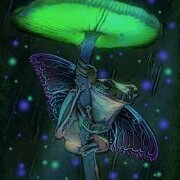-
Forum Statistics
10.9k
Total Topics87k
Total Posts -
Member Statistics
-
Who's Online 0 Members, 0 Anonymous, 54 Guests (See full list)
- There are no registered users currently online
-
Recently Browsing
- No registered users viewing this page.
-
Topics
-
Posts
-
Does psionics exist and do they fall under this category, and if so, how? Or did I miss it in another post?
-
Warlocks, Shamans, and Witches. It is among these spellcasters that you are most likely to find Eldritch spells being used. The primary difference between Eldritch and Arcane magic is in where the power comes from. Which in turn dictates how that power is applied to achieve a given effect. Arcane magic works by subtlety adjusting the balance between Order and Chaos that underlies our reality, by directly interacting with those forces. Eldritch magic in contrast adjusts that balance by introducing, (and in some cases removing again), Chaos from Elsewhere. Less subtle and elegant than Arcane magic, but when Chaos and/or Destruction are the goal Eldritch magic is easily as, if not more, powerful. Now the reason that Eldritch magic is more likely with these spellcasters than others is a matter of how these casters gain their magic in the first place. Warlocks (and technically Dracons, Naze, and the like) gain their spells by forming a Pact with a Patron of one type or another. And it depends on the Patron and the circumstances, as to which mode (Wizard, Sorcerer, or Cleric) will be used. Of course there are any number of Warlocks who will try to find ways of recording the spells they are given regardless of the mode the Patron selected. Which brings us to Shamans and Witches. Unlike Warlocks, Shamans and Witches don't make an enduring pact with a single being but rather bargain with many different types of magical beings to gain the spells they need. This can lead to them becoming a Warlock, Druid, or Cleric, depending upon the type of spells they are most interested in. After all, why keep shopping around if you can get everything you're looking for in one place and for a single set of terms. The most notable difference between Shamans and Witches is that Shamans are typically members of a Barbarian tribe and so tend to be illiterate. Thus leaving them little choice but to follow the Sorcerer path for learning spells. Witches, by contrast, tend to live closer to civilization. On the edges of typically, but still, Close enough that reading is a skill that they can typically learn.
-
We all have had traumatic experiences - I've mentioned my mother taking me to see The Exorcist at 6-years-old. But there are several other moments from my childhood, one being: My father, for a while, had a night job (more second shift, not overnight) at a facility for the "mentally impaired" (they still had them at the time and that was NOT what it was called, but that was a different time, populated with individuals who didn't make a living by finding ANY reason to be offended . . . but I digress) and we would pick him up very late. The parking lot was dark and there were very few lights outside the building. As a child, the building seemed far taller than the 10 or so floors it actually was and, with dim lights burning in random windows, had an eerie feel about it. But that was not why it was traumatic. No, the traumatic thing about it was the screaming. Blood curdling screams. Horrific cries from the depths of tormented souls that seemed to go on forever. Imagine being a small child sitting in a dark parking lot, staring at a building that, to you, is straight out of some demented nightmare, screams echoing all around and your father walking out of that darkness, whence those haunting sounds emanated. Yeah. This was BEFORE The Exorcist. Good times.
-
The most common spellcasters are Wizards and Sorcerers who use Arcane magic. Maguses, Shamans, and some Warlocks also use Arcane magic. But more on them in a bit. Arcane magic works by subtlety adjusting the balance between Order and Chaos that underlies our reality. The primary difference between Wizards and Sorcerers is in how they learn and cast their spells. Which most of you are likely already familiar with. But, for completeness and those who may not know. Wizards load spells into their minds with the mana attached and once the spell is cast it vanishes from their mind leaving room for a new spell. Sorcerers on the other hand learn spells permanently (well simi-permanently. more on this in a bit) With the mana as a pool to be taped and channeled through the spell as needed. Wizards can take a Feat called Spell mastery that allows them to permanently learn a spell the way a Sorcerer does. And likewise Sorcerers can take a Feat called Spell Flexibility which allows them to temporarily learn a spell as Wizards do. Seeing the advantages of being able to do both some adventurers tried training both ways. This proved to be quite difficult as the two ways of learning spells are almost opposites. Which puts quite a bit of strain on the mind of the student. Which eventually lead to the development of the Magus class. Which is designed specifically to address that problem. Progress is somewhat slower than for students who follow just Wizard or Sorcerer paths. But those who choose Magus say that it worth it. Anyway moving on. The next most common type of spellcaster is the Cleric or Priest. Priest are typically those who stay in Towns and Cities taking care of their congregations. While the Cleric is out with groups of adventurers keeping evil beings away from civilized lands. These spellcasters use Holy Magic provided by the Gods. Or Infernal magic provided by Demons or Devils in the case of Evil Clerics and Priests. Typically their handling of spells is much the same as Wizards. With the spells they are likely to need being provided by the Being they serve. Healing spells being a notable exception in most cases. These tend to be installed Sorcerer style and can be cast extra times by sacrificing other spells for the mana needed to do so. The difference between Good and Evil Healing spells is a side topic that I'll expound on more fully another time. Just as I will cover Warlocks, Shamans and the rest a bit later in this series.
-



